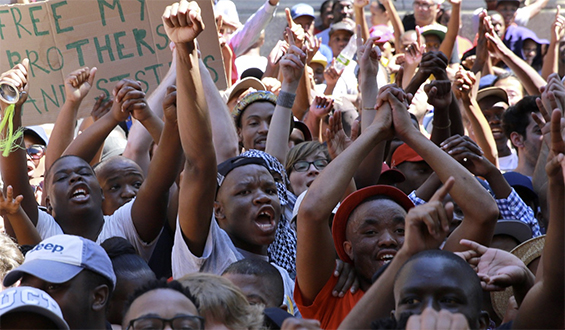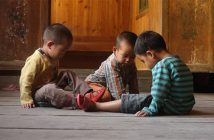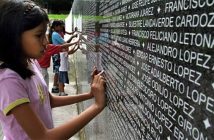
South African students protesting tuition hikes met at the country’s government buildings for some of the largest protests in decades, resulting in violence and clashes with police.
Students upset about an increase in education fees met at the Union Buildings in the South African capital of Pretoria. Protests became violent, with some of the students setting fires and throwing stones. Others climbed the statue of Louis Botha on the lawn. Police repelled them with stun grenades, tear gas, and a water cannon as a police helicopter kept watch. Most of the protestors, however, remained nonviolent, and many chanted and sang instead.
After meetings with student leaders and university representatives, South African President Jacob Zuma made concessions to the protesters’ wishes, while also acknowledging that the institutions set tuition prices independently of the government.
There will be no educational fee increase in 2016, but the students were asking for an entirely free education. The combination of tuition, textbooks, and room and board can cost a South African student thousands of dollars a year.
South Africa has a large gap between the higher and lower classes, meaning that some students come from severely impoverished backgrounds. Black students are often affected the most adversely, with student loans resulting in what many are calling “black debt.”
One protester, 18-year-old Bongani Shabangu, is studying education at a university in Pretoria. He said:
We should be having free education. Most of us are from poor families.
Another protestor, Troy Mathebula, who attended the meeting with President Zuma, was also upset that the government had not met the students’ demands. He said:
What’s going to happen in 2017? We have to come up with a solution that’s going to cover us for the next many years. … We’re not happy about it.
The outrage over fee hikes has led to one of the biggest student movements since 1994 when the nation rejected the control of a white minority. This unrest could destabilize the power of the ruling African National Congress party, according to the BBC. The party has met with public outrage over their handling of poverty, unemployment, and government corruption.
According to the Associated Press, the student protests began at the prestigious University of the Witwatersrand in Johannesberg after the administration stated that they would increase tuition in 2016 by 10.5%. Since the resulting uproar, they have suspended classes and canceled the tuition increase.
At least ten other universities were also forced to close. Karabo Ngoepe, Genevieve Quintal, and Adam Wakefield of News24 report that demonstrations are happening at Rhodes University, Stellenbosch University, the University of Cape Town, Nelson Mandela Metropolitan University, the University of Pretoria, the University of the Free State, the University of Limpopo, the University of KwaZulu-Natal, Tshwane University of Technology, the Cape Peninsula University of Technology, the University of the Western Cape, Walter Sisulu University, the University of Johannesburg, and the University of Fort Hare.
Students packed into buses and trains to travel to the capital for the demonstrations.
Zuma has said that he invites protests from students as long as they remain nonviolent.




